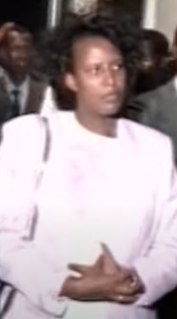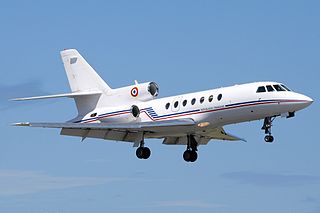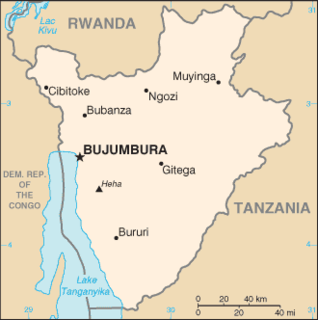| |||||
| Decades: | |||||
|---|---|---|---|---|---|
| See also: | Other events of 1994 List of years in Burundi | ||||
The following lists events that happened during 1994 in Burundi .
| |||||
| Decades: | |||||
|---|---|---|---|---|---|
| See also: | Other events of 1994 List of years in Burundi | ||||
The following lists events that happened during 1994 in Burundi .

Juvénal Habyarimana was a Rwandan politician and military officer who served as the second president of Rwanda, from 1973 until 1994. He was nicknamed Kinani, a Kinyarwanda word meaning "invincible".

Cyprien Ntaryamira was a Burundian politician who served as President of Burundi from 5 February 1994 until his death two months later. A Hutu born in Burundi, Ntaryamira studied there before fleeing to Rwanda to avoid ethnic violence and complete his education. Active in a Burundian student movement, he cofounded the socialist Burundi Workers' Party and earned an agricultural degree. In 1983 he returned to Burundi and worked agricultural jobs, though he was briefly detained as a political prisoner. In 1986 he cofounded the Front for Democracy in Burundi (FRODEBU), and in 1993 FRODEBU won Burundi's general elections. He subsequently became the Minister of Agriculture and Animal Husbandry on 10 July, but in October Tutsi soldiers killed the president and other top officials in an attempted coup.

Sylvestre Ntibantunganya is a Burundian politician. He was President of the National Assembly of Burundi from 23 December 1993 to 30 September 1994, and President of Burundi from 6 April 1994 to 25 July 1996.

The assassination of presidents Juvénal Habyarimana and Cyprien Ntaryamira in the evening of April 6, 1994 was the proximate trigger for the Rwandan genocide, which resulted in the murder of approximately 800,000 Tutsi and a smaller number of moderate Hutu. The first few days following the assassinations included a number of key events that shaped the subsequent course of the genocide. These included: the seizing of power by an interim government directed by the hard-line Akazu clique; the liquidation of opposition Hutu politicians; the implementation of plans to carry out a genocide throughout the country; and the murder of United Nations peacekeepers, contributing to the impulse of the international community to refrain from intervention.

Sylvie Kinigi is a Burundian politician and economist who served as Prime Minister of Burundi from 10 July 1993 to 7 February 1994, and acting president from November 1993 to 5 February 1994, making her the second African woman to serve as a president.
François Ngeze is a Burundian retired politician. He served as the acting head of state of Burundi from 21 October 1993 to 27 October 1993. He was chosen by the military Committee of Public Salvation, a group of army officers that staged the 1993 Burundian coup d'état attempt overthrew the democratically elected government of president Melchior Ndadaye.
Burundi Workers' Party was a clandestine communist party in Burundi. Its primary constituency was the large Burundian refugee population situated in neighboring Rwanda.
Jean Mutsinzi is a Rwandan former jurist in the African Court on Human and Peoples' Rights. He was elected for a six-year term of office on 22 January 2006 at the Eighth Ordinary Session of the Executive Council of the African Union, held in Khartoum, Sudan.

On the evening of 6 April 1994, the aircraft carrying Rwandan president Juvénal Habyarimana and Burundian president Cyprien Ntaryamira, both Hutu, was shot down with surface-to-air missiles as their jet prepared to land in Kigali, Rwanda. The assassination set in motion the Rwandan genocide, one of the bloodiest events of the late 20th century.

The following is a partial chronology of significant events surrounding the 1994 Rwandan genocide.

The Gikondo massacre was the mass murder of about 110 people of Tutsi identity, including children, who sheltered in a Polish Pallottine mission church in Gikondo, Kigali. The massacre took place on April 9, 1994 and was executed by Interahamwe militia under supervision of the Hutu presidential guard. The massacre was the first absolute proof of a genocide discovered by UNAMIR during the Rwandan genocide in 1994.

United Nations Security Council resolution 912, adopted unanimously on 21 April 1994, after reaffirming all resolutions on the situation in Rwanda, particularly resolutions 872 (1993) and 909 (1994), the council expressed its alarm and condemnation of the large-scale violence in the country which resulted in the death of thousands of innocent civilians, and proposed a revised mandate of the United Nations Assistance Mission for Rwanda (UNAMIR).

United Nations Security Council resolution 1012, adopted unanimously on 28 August 1995, after considering the situation in an African landlocked country, Burundi. The council established an international inquiry over the assassination of President Melchior Ndadaye during a military coup in October 1993.

The 1996 Burundian coup d'état was a military coup d'état that took place in Burundi on 25 July 1996. In the midst of the Burundi Civil War, former president Pierre Buyoya deposed Hutu President Sylvestre Ntibantunganya. According to Amnesty International, in the weeks following the coup, more than 6,000 people were killed in the country. This was Buyoya's second successful coup, having overthrown Jean-Baptiste Bagaza in 1987.
The following lists events that happened during 1994 in the Republic of Rwanda.
The following lists events that happened during 1993 in Burundi.
Cyriaque Simbizi was a Burundian Minister of Communication who was assassinated in a plane shootdown.

On 21 October 1993, a coup was attempted in Burundi by a Tutsi–dominated army faction. The coup attempt resulted in assassination of Hutu President Melchior Ndadaye and the deaths of other officials in the constitutional line of presidential succession. François Ngeze was presented as the new President of Burundi by the army, but the coup failed under domestic and international pressure, leaving Prime Minister Sylvie Kinigi in charge of the government.
Bernard Ciza was a Burundian politician. Originating from Bururi Province, he became a leading member of the Front pour la Démocratie au Burundi (FRODEBU) and in 1993 became Deputy Prime Minister for Economic and Social Affairs under Prime Minister Sylvie Kinigi. He survived the coup attempt of October 1993 and in February 1994 became Minister of State for Development Planning and Reconstruction. He died later that year when the plane on which he was traveling was shot down over Kigali.